Stanford scientists slam former colleague, radiologist and White House advisor over pandemic views
More than 80 Stanford Medicine physicians and scientists issued a letter in opposition of Scott Atlas, their former colleague, radiologist and now White House coronavirus advisor, for his controversial views surrounding the pandemic.
The faculty members include physicians, researchers, epidemiologists and health policy experts, who voiced their criticisms in a letter shared Wednesday. Their concerns stem from recent reports that Atlas is skeptical of mask wearing and supports “herd immunity” as a response to COVID-19.
MDs signing the letter cited the Hippocratic Oath in their desire to speak out.
“To prevent harm to the public’s health, we also have a moral and an ethical responsibility to call attention to the falsehoods and misrepresentations of science recently fostered by Dr. Scott Atlas, a former Stanford Medical School colleague and current senior fellow at the Hoover Institute at Stanford University,” the group wrote in a letter circulated among colleagues at the California institution. “Many of his opinions and statements run counter to established science and, by doing so, undermine public health authorities and the credible science that guides effective health policy.”
In their Sept. 9 letter, the Stanford scientists stressed that “Failure to follow the science—or deliberately misrepresenting the science—will lead to immense avoidable harm. We believe that social and economic activity can reopen safely, if we follow polices that are consistent with science.”
You can read the full letter, shared publicly by Stanford dermatologist Roxana Daneshjou, MD, PhD, here.

